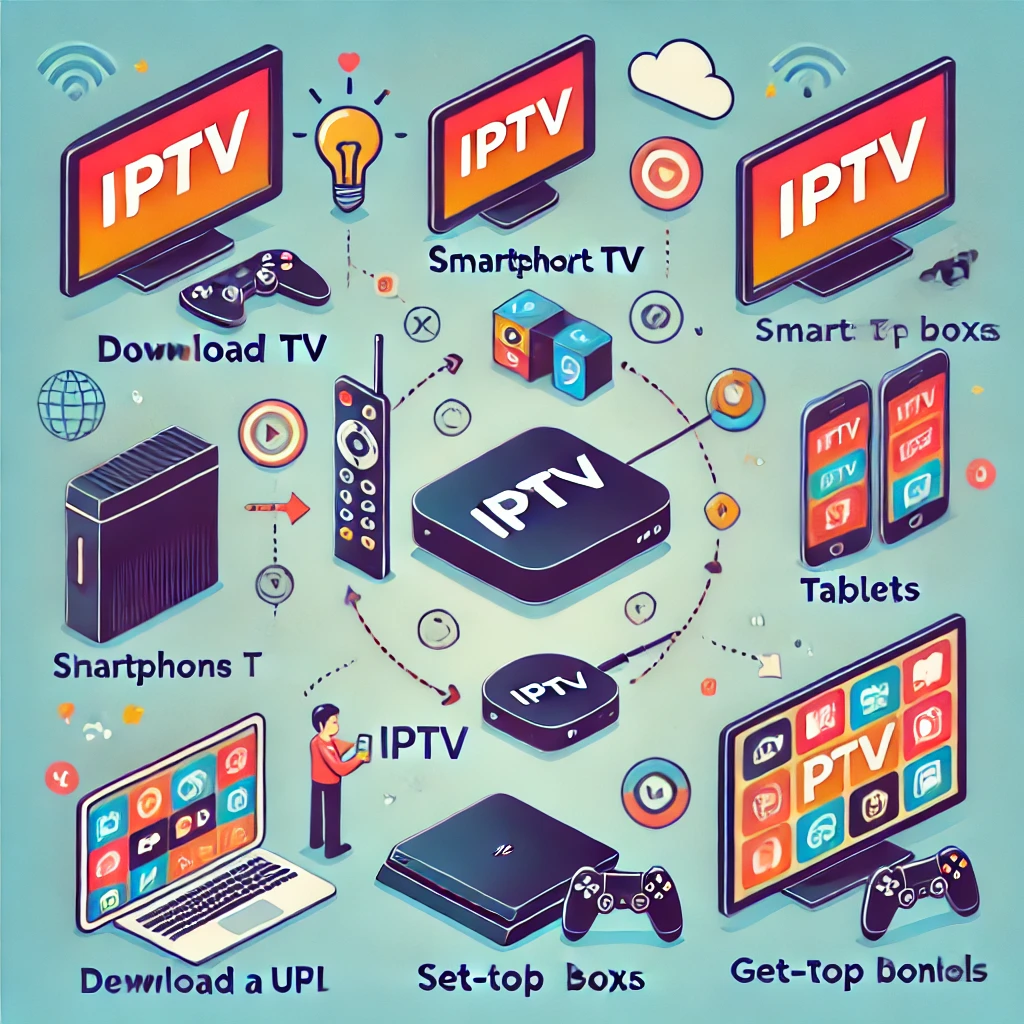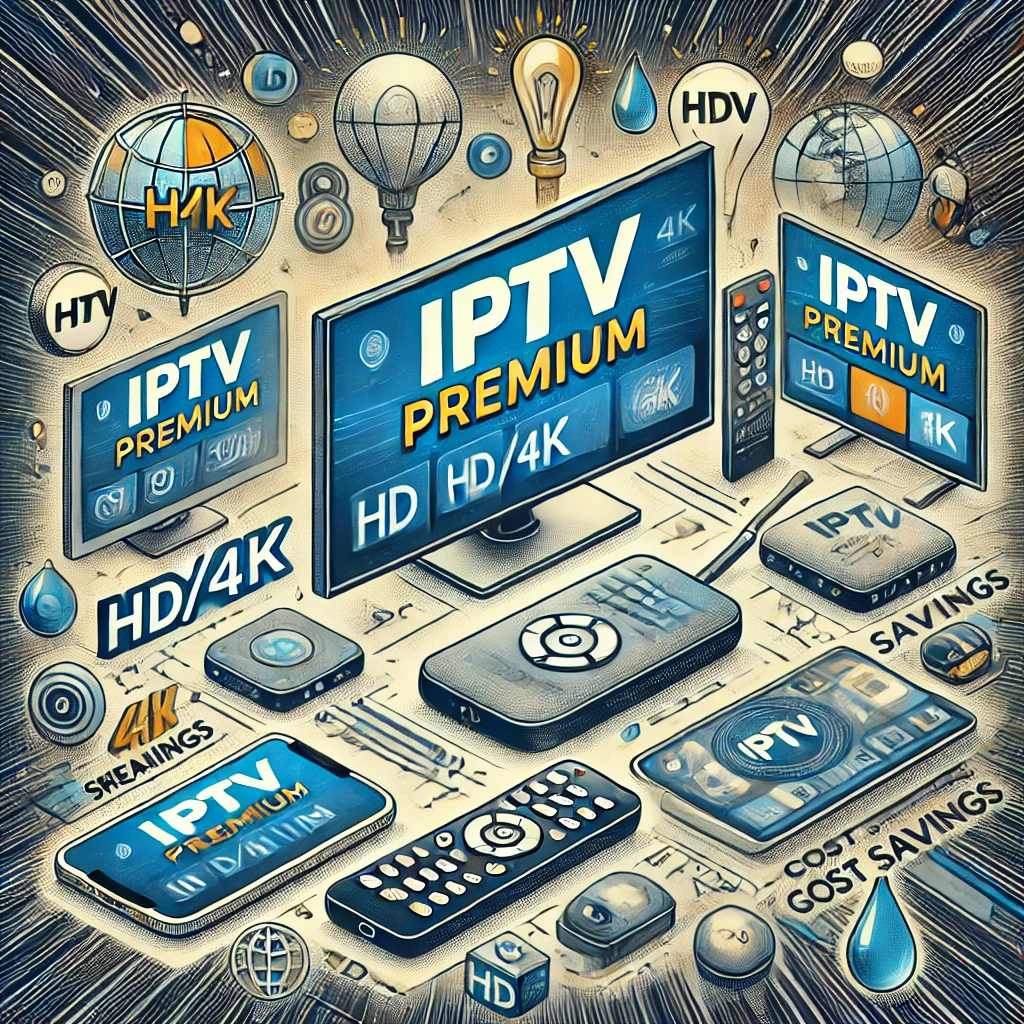Best Guide Optimizing IPTV with DNS: Speed, Streaming, and Geo-Unblocking 2024
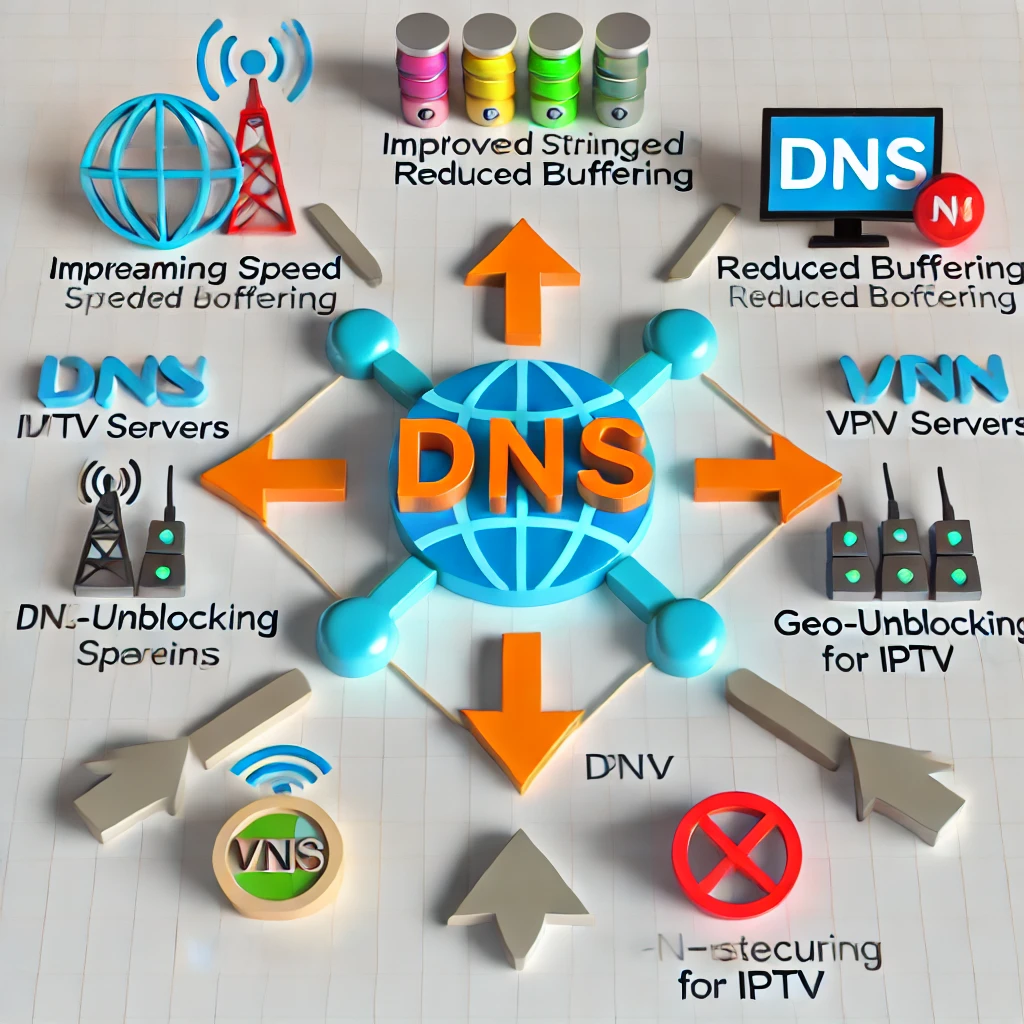
Table of Contents
Introduction
IPTV, or Internet Protocol Television, has rapidly become a popular way to consume media content, as it allows users to stream television channels and video content through internet connections. Unlike traditional cable or satellite TV, IPTV offers flexibility in terms of channels, on-demand content, and accessibility across different devices.
But there’s a key element that can make or break your IPTV experience: DNS (Domain Name System). DNS plays a critical role in translating domain names into IP addresses, which is necessary for devices to communicate over the internet. For IPTV users, an optimized DNS can significantly enhance streaming quality by reducing buffering, improving speed, and even bypassing geo-restrictions.
This guide is designed to help you understand how DNS affects IPTV and how to choose the best DNS for IPTV to boost your overall streaming experience. We will also introduce StateIPTV.com, a highly recommended IPTV provider known for its reliability and high-quality streaming.
What is IPTV and How Does It Work?
IPTV Basics
IPTV stands for Internet Protocol Television. Instead of using satellite signals or cables, IPTV delivers television content through internet protocol (IP) networks. This allows users to stream live television, watch video-on-demand (VOD) content, or access a vast array of media without traditional broadcasting infrastructure.
- Types of IPTV services:
- Live IPTV: Streaming live television broadcasts, similar to traditional TV but through an internet connection.
- Video on Demand (VOD): Access to a library of movies, series, and shows that you can watch whenever you like.
- Time-shifted media: Allows users to watch previously aired TV shows at a convenient time.
IPTV operates on a user-friendly model that makes it easy to navigate through a wide selection of content. It often requires a subscription service, a set-top box, or an app on devices like smart TVs, smartphones, and streaming devices (like Fire Stick, Roku, etc.).
Role of the Internet in IPTV
Your internet connection is the lifeline of your IPTV service. Since IPTV relies on internet transmission, your connection quality directly impacts the streaming experience. A high-speed, stable internet connection is essential to ensure smooth playback, especially when streaming in high-definition (HD) or 4K.
Recommended Internet Speed for IPTV:
- Standard Definition (SD) streaming: Minimum of 3-4 Mbps
- High Definition (HD) streaming: 5-8 Mbps
- 4K UHD streaming: 25 Mbps or more
For IPTV to work optimally, it is also necessary to have efficient communication between your device and the IPTV servers. This is where DNS becomes an integral factor. A poor DNS setting can lead to issues such as buffering, lag, and poor resolution, ruining the viewing experience.
Pro Tip: If you experience frequent buffering or lag, it may be time to optimize your DNS settings to ensure that your device communicates efficiently with the IPTV servers.
What is DNS and Why is It Important for IPTV?
DNS, or Domain Name System, is essentially the phonebook of the internet. It translates human-friendly domain names (like example.com) into IP addresses that computers use to identify each other on the network. Every time you connect to a website or service, a DNS server helps direct your request to the correct destination.
For IPTV users, the choice of DNS provider can have a significant impact on streaming performance. A fast and reliable DNS will ensure quicker connections to IPTV servers, reducing the chances of buffering, lag, or even interruptions in service. On the other hand, a slow or inefficient DNS can lead to delayed connections and poor streaming quality.
How DNS Affects IPTV Performance
- Faster Connection Speeds: DNS servers with low latency can resolve domain names quicker, helping you connect to IPTV streams faster.
- Reduced Buffering: An optimized DNS can help reduce the time it takes to load IPTV content, minimizing buffering and lag.
- Bypassing Geo-restrictions: Some IPTV content may be restricted based on geographic location. DNS services that offer geo-unblocking can help you access region-locked channels and content.
- Reliability: A reliable DNS ensures that your streaming connection is stable and uninterrupted. Poor DNS performance can result in downtime or loss of connection.
Given the role of DNS in optimizing IPTV, it’s important to choose the right DNS service to ensure a seamless viewing experience. The next section will cover the key factors to consider when selecting the best DNS for IPTV.
Key Factors to Consider When Choosing the Best DNS for IPTV
When selecting the best DNS for IPTV, it’s crucial to take into account several factors that will determine how well your IPTV service performs. Here are some key considerations:
Speed and Latency
One of the most important factors to consider is the speed and latency of the DNS server. DNS servers with low latency ensure that requests to access content are processed quickly. This directly influences how fast your IPTV content loads, minimizing buffering or delays.
Reliability and Uptime
A reliable DNS service with a high uptime guarantee ensures that your IPTV service remains available without unexpected interruptions. A DNS server that frequently goes down can cause drops in your IPTV connection and negatively impact your viewing experience.
Geo-Unblocking Features
Some IPTV content is restricted based on geographic locations. DNS services that support Smart DNS or other geo-unblocking features can help you bypass these restrictions and access IPTV channels or content that may otherwise be unavailable in your region.
Security and Privacy
When selecting a DNS for IPTV, it’s important to ensure that the service offers strong security and privacy protections. Some free DNS services may log your data or expose you to malicious content, so opting for a DNS with encryption and no-log policies can safeguard your privacy and security while streaming.
With these factors in mind, let’s explore the top DNS providers for IPTV in the next section.
Best DNS Providers for IPTV in 2024
There are several DNS services that work particularly well with IPTV, each offering different features. Below are some of the best DNS providers for IPTV in 2024:
Google Public DNS
Google Public DNS is a free DNS service provided by Google that offers fast and reliable DNS resolution. It’s one of the most popular DNS services and works well for IPTV users seeking improved streaming speed and security.
- Pros: Free, fast, and secure. It is backed by Google’s infrastructure, ensuring high reliability.
- Cons: Limited privacy due to Google’s data collection policies.
Cloudflare DNS (1.1.1.1)
Cloudflare DNS is a popular choice for users seeking a fast, private, and secure DNS service. Cloudflare promises to be one of the fastest DNS services available, and it is highly regarded for its focus on privacy.
- Pros: Fast, secure, and privacy-focused. Cloudflare offers a no-log policy to protect your data.
- Cons: Some users report occasional issues with geo-unblocking certain IPTV content.
OpenDNS
OpenDNS is a feature-rich DNS service that offers content filtering, making it ideal for families or users who want to block inappropriate content. It’s also known for its reliability and fast DNS resolution times.
- Pros: Reliable, offers content filtering, and fast DNS resolution times.
- Cons: Some features require a paid subscription.
Quad9 DNS
Quad9 is a security-focused DNS provider that blocks malicious domains, protecting users from phishing attacks and malware. It also offers fast DNS resolution, making it a great choice for IPTV streaming.
- Pros: Strong security, fast DNS resolution, blocks malicious domains.
- Cons: May not support some advanced geo-unblocking features.
Each of these DNS providers has its strengths, and the best choice will depend on your specific needs, such as speed, security, or geo-unblocking capabilities.
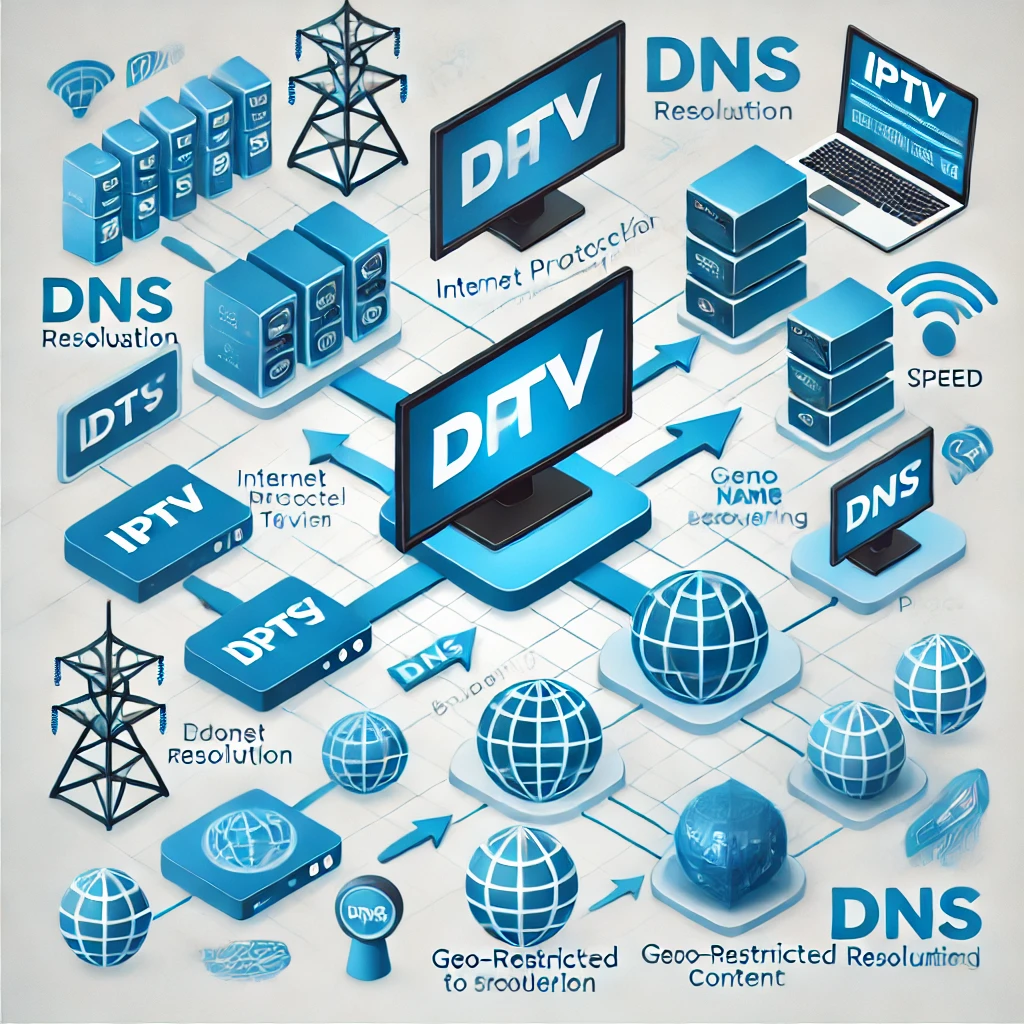
How to Change DNS Settings for IPTV
Changing your DNS settings can greatly improve your IPTV experience by enhancing speed, reducing buffering, and allowing access to geo-restricted content. Depending on your device, the process of changing DNS settings may vary. Below, we provide instructions for changing DNS settings on different types of devices commonly used for IPTV streaming.
On IPTV Boxes
If you are using a dedicated IPTV box like MAG, Android TV, or Fire Stick, you can follow these steps to update your DNS settings:
- Step 1: Go to your IPTV box settings.
- Step 2: Look for “Network” or “Connection” settings.
- Step 3: Select “Advanced” and navigate to DNS settings.
- Step 4: Manually enter the DNS server addresses. Use DNS servers like 8.8.8.8 (Google DNS) or 1.1.1.1 (Cloudflare DNS).
- Step 5: Save your settings and restart the device for the changes to take effect.
On Routers
Changing DNS settings directly on your router is a convenient way to apply the DNS changes to all devices connected to your network. Here’s how to do it:
- Step 1: Access your router’s admin panel by typing your router’s IP address into a web browser (typically 192.168.1.1 or 192.168.0.1).
- Step 2: Log in using your admin username and password (usually found on the back of the router).
- Step 3: Navigate to the “DNS settings” section in the router’s admin interface.
- Step 4: Enter the new DNS server addresses (e.g., Google DNS: 8.8.8.8 and 8.8.4.4 or Cloudflare DNS: 1.1.1.1 and 1.0.0.1).
- Step 5: Save your settings and reboot the router for the changes to apply.
On Smartphones and Tablets
To change DNS settings on mobile devices, follow these simple steps:
- Step 1: Go to the “Settings” menu on your device.
- Step 2: Open the “Wi-Fi” settings and select the network you’re connected to.
- Step 3: Scroll down and look for DNS settings (you may need to switch to manual configuration).
- Step 4: Enter the desired DNS server addresses (e.g., Google DNS: 8.8.8.8 or Cloudflare DNS: 1.1.1.1).
- Step 5: Save your changes, and restart the device if needed.
Changing DNS settings across these devices ensures that your IPTV service benefits from optimized speed and stability. By following these simple steps, you can ensure a better streaming experience across all your IPTV-enabled devices.
Common Issues When Using DNS for IPTV (and How to Fix Them)
Buffering and Lag
One of the most common problems IPTV users face is buffering or lag during streaming. This can be caused by several factors, but DNS settings often play a crucial role. A slow or inefficient DNS server can result in delays in connecting to IPTV servers, leading to extended buffering times.
How to Fix Buffering and Lag:
- Solution 1: Switch to a faster DNS service like Google Public DNS or Cloudflare DNS to reduce latency.
- Solution 2: Ensure that your internet speed meets the minimum requirements for streaming (at least 5-8 Mbps for HD streaming).
- Solution 3: Restart your router and device to clear any temporary connection issues.
Geo-Blocked Content
Many IPTV services offer channels and content that may be restricted based on geographic location. If you are trying to access a channel that is unavailable in your region, your DNS may be the issue. Some DNS services provide geo-unblocking features, allowing you to access content from other regions.
How to Fix Geo-Blocked Content:
- Solution 1: Use a DNS service with Smart DNS capabilities, such as Smart DNS Proxy or Unlocator, to bypass geo-blocks.
- Solution 2: Consider using a VPN if DNS does not resolve the issue. A VPN can help mask your IP address and make it appear as if you are accessing the content from a different country.
DNS Leaks
DNS leaks occur when your ISP’s DNS servers are still being used even after you’ve changed your DNS settings. This can affect your privacy and cause issues with accessing geo-restricted content. It’s important to ensure that your new DNS settings are being properly applied.
How to Fix DNS Leaks:
- Solution 1: Test for DNS leaks using online DNS leak test tools to check whether your DNS is working correctly.
- Solution 2: Manually set DNS on your device or router to ensure it doesn’t default back to your ISP’s DNS servers.
By addressing these common issues, you can greatly enhance your IPTV experience, ensuring smooth, uninterrupted streaming.
DNS vs. VPN: What’s the Best Option for IPTV?
When optimizing your IPTV experience, you might wonder whether it’s better to use a DNS or a VPN (Virtual Private Network). Both technologies offer specific benefits, but which one is the right choice for IPTV? Let’s break down the differences between the two to help you decide which is best for your needs.
DNS vs. VPN for Speed
DNS services are typically faster than VPNs because they don’t encrypt your internet traffic. A DNS works by simply resolving domain names to IP addresses, which has minimal impact on internet speed. This makes DNS the ideal choice for users who prioritize fast, uninterrupted IPTV streaming with no buffering.
VPN services, on the other hand, route your internet traffic through encrypted servers, which can add extra latency and slightly reduce your internet speed. While the speed difference might not always be noticeable, VPNs generally tend to slow down connections due to the additional encryption process.
DNS vs. VPN for Security
While a DNS can help improve your IPTV speed, it doesn’t offer any security or privacy protections. If security is a priority for you, then a VPN may be the better option. A VPN encrypts all your internet traffic, providing an additional layer of privacy and protection from cyber threats.
With a VPN, your online activity is hidden from your ISP, and your real IP address is masked, ensuring anonymity. This is particularly useful for users concerned about their privacy while accessing geo-restricted content on IPTV platforms.
DNS vs. VPN for Geo-Unblocking
Both DNS and VPN services can be used to unblock geo-restricted IPTV content. However, they work in different ways:
- DNS: Smart DNS services can mask your location without encrypting your traffic, allowing you to access region-locked IPTV channels without affecting your speed.
- VPN: A VPN not only changes your location but also encrypts your traffic, which may slightly reduce your internet speed but offers better privacy.
If speed is more important to you than privacy, then a Smart DNS service is likely the best choice. If security and privacy are your top concerns, a VPN will provide the extra layer of protection you need.
When to Use DNS or VPN for IPTV
- Use DNS if: You want faster streaming speeds, minimal impact on your internet performance, and need to access geo-restricted IPTV content without worrying about security concerns.
- Use VPN if: You need added security, want to encrypt your internet traffic, and are willing to trade some speed for enhanced privacy and protection.
Ultimately, the decision between DNS and VPN depends on your priorities. If speed is critical and privacy is less of a concern, DNS is the better option for IPTV streaming. However, if you want both security and the ability to bypass geo-restrictions, a VPN may be more suitable.
Best IPTV Provider for Seamless Streaming: StateIPTV.com
In addition to optimizing your DNS settings for IPTV, it’s essential to choose the right IPTV provider to ensure a smooth, high-quality streaming experience. One of the best providers in the market is StateIPTV.com, which offers reliable IPTV services with minimal buffering and access to a wide range of channels.
Why Choose StateIPTV.com
StateIPTV.com is known for its top-notch streaming performance, offering thousands of live TV channels, movies, and on-demand content. The service is compatible with popular IPTV players and devices, making it easy to use across different platforms, including Android, iOS, Smart TVs, and IPTV boxes.
- Excellent Streaming Quality: StateIPTV.com delivers smooth and high-definition streaming, with very little buffering, even during peak hours.
- Wide Range of Channels: With access to thousands of channels from around the world, StateIPTV.com provides something for every user, whether you’re into sports, movies, news, or entertainment.
- Geo-Unblocking Capabilities: Combined with a fast DNS or VPN, StateIPTV.com allows you to access geo-blocked content from anywhere in the world.
- Affordable Pricing: StateIPTV.com offers competitive pricing packages, providing excellent value for users who want access to premium IPTV services without breaking the bank.
How StateIPTV.com Complements Optimized DNS Settings
StateIPTV.com works seamlessly with optimized DNS settings, making it one of the best IPTV providers for users looking to improve streaming performance. By pairing a fast DNS service with StateIPTV.com, you can significantly reduce buffering, enhance streaming speeds, and access geo-restricted content with ease.
Whether you choose to use a DNS service or VPN, StateIPTV.com ensures that you get the best IPTV experience with reliable, high-quality streaming across all your devices.
DNS vs. VPN: What’s the Best Option for IPTV?
When optimizing your IPTV experience, you might wonder whether it’s better to use a DNS or a VPN (Virtual Private Network). Both technologies offer specific benefits, but which one is the right choice for IPTV? Let’s break down the differences between the two to help you decide which is best for your needs.
DNS vs. VPN for Speed
DNS services are typically faster than VPNs because they don’t encrypt your internet traffic. A DNS works by simply resolving domain names to IP addresses, which has minimal impact on internet speed. This makes DNS the ideal choice for users who prioritize fast, uninterrupted IPTV streaming with no buffering.
VPN services, on the other hand, route your internet traffic through encrypted servers, which can add extra latency and slightly reduce your internet speed. While the speed difference might not always be noticeable, VPNs generally tend to slow down connections due to the additional encryption process.
DNS vs. VPN for Security
While a DNS can help improve your IPTV speed, it doesn’t offer any security or privacy protections. If security is a priority for you, then a VPN may be the better option. A VPN encrypts all your internet traffic, providing an additional layer of privacy and protection from cyber threats.
With a VPN, your online activity is hidden from your ISP, and your real IP address is masked, ensuring anonymity. This is particularly useful for users concerned about their privacy while accessing geo-restricted content on IPTV platforms.
DNS vs. VPN for Geo-Unblocking
Both DNS and VPN services can be used to unblock geo-restricted IPTV content. However, they work in different ways:
- DNS: Smart DNS services can mask your location without encrypting your traffic, allowing you to access region-locked IPTV channels without affecting your speed.
- VPN: A VPN not only changes your location but also encrypts your traffic, which may slightly reduce your internet speed but offers better privacy.
If speed is more important to you than privacy, then a Smart DNS service is likely the best choice. If security and privacy are your top concerns, a VPN will provide the extra layer of protection you need.
When to Use DNS or VPN for IPTV
- Use DNS if: You want faster streaming speeds, minimal impact on your internet performance, and need to access geo-restricted IPTV content without worrying about security concerns.
- Use VPN if: You need added security, want to encrypt your internet traffic, and are willing to trade some speed for enhanced privacy and protection.
Ultimately, the decision between DNS and VPN depends on your priorities. If speed is critical and privacy is less of a concern, DNS is the better option for IPTV streaming. However, if you want both security and the ability to bypass geo-restrictions, a VPN may be more suitable.
Best IPTV Provider for Seamless Streaming: StateIPTV.com
In addition to optimizing your DNS settings for IPTV, it’s essential to choose the right IPTV provider to ensure a smooth, high-quality streaming experience. One of the best providers in the market is StateIPTV.com, which offers reliable IPTV services with minimal buffering and access to a wide range of channels.
Why Choose StateIPTV.com
StateIPTV.com is known for its top-notch streaming performance, offering thousands of live TV channels, movies, and on-demand content. The service is compatible with popular IPTV players and devices, making it easy to use across different platforms, including Android, iOS, Smart TVs, and IPTV boxes.
- Excellent Streaming Quality: StateIPTV.com delivers smooth and high-definition streaming, with very little buffering, even during peak hours.
- Wide Range of Channels: With access to thousands of channels from around the world, StateIPTV.com provides something for every user, whether you’re into sports, movies, news, or entertainment.
- Geo-Unblocking Capabilities: Combined with a fast DNS or VPN, StateIPTV.com allows you to access geo-blocked content from anywhere in the world.
- Affordable Pricing: StateIPTV.com offers competitive pricing packages, providing excellent value for users who want access to premium IPTV services without breaking the bank.
How StateIPTV.com Complements Optimized DNS Settings
StateIPTV.com works seamlessly with optimized DNS settings, making it one of the best IPTV providers for users looking to improve streaming performance. By pairing a fast DNS service with StateIPTV.com, you can significantly reduce buffering, enhance streaming speeds, and access geo-restricted content with ease.
Whether you choose to use a DNS service or VPN, StateIPTV.com ensures that you get the best IPTV experience with reliable, high-quality streaming across all your devices.
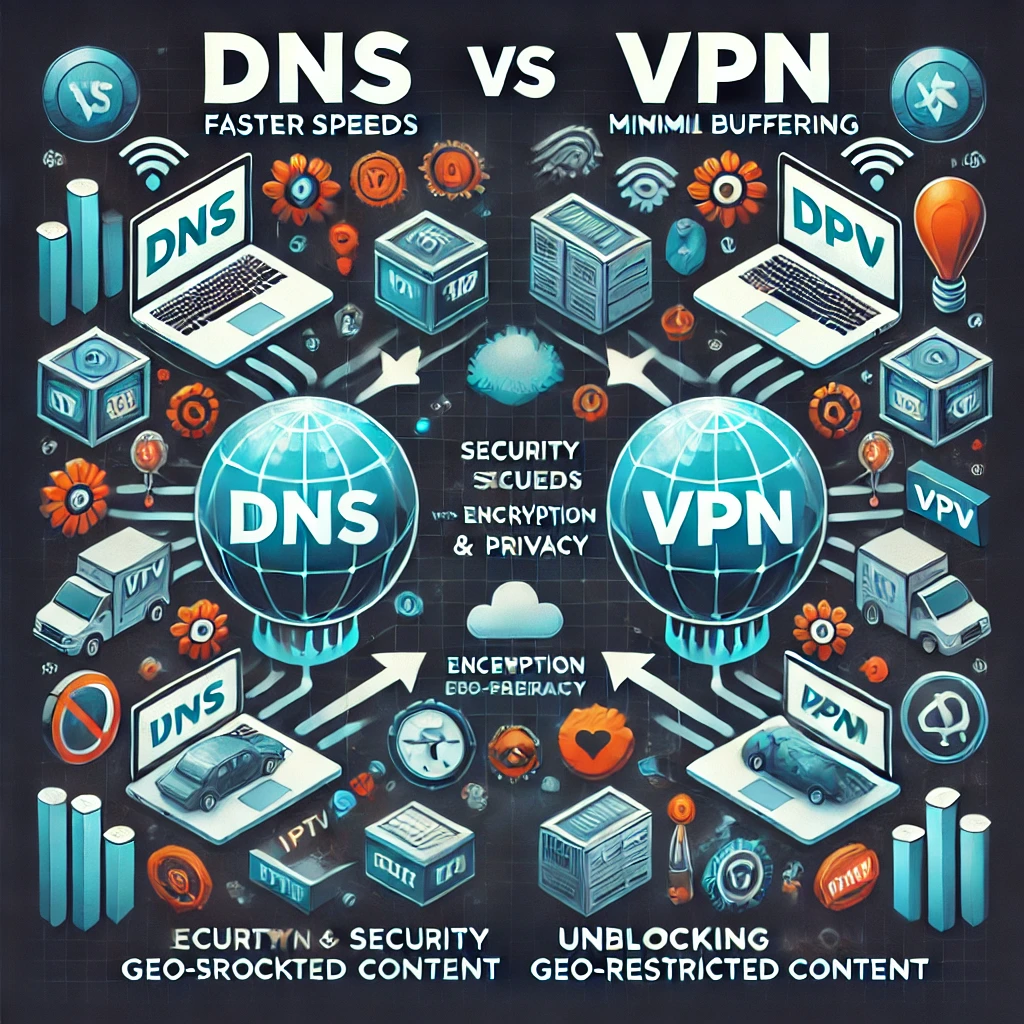
What’s the Best DNS for Unblocking IPTV Channels?
The best DNS for unblocking IPTV channels is typically a Smart DNS service. Services like Smart DNS Proxy or Unlocator are designed to bypass geo-restrictions and allow users to access IPTV channels from different regions. These DNS services mask your location without slowing down your connection, making them ideal for IPTV users looking for fast and reliable access to geo-blocked content.
Can I Use a Free DNS for IPTV, and Is It Safe?
While it is possible to use free DNS services like Google Public DNS or Cloudflare DNS, free DNS services may come with certain limitations. Free DNS services are generally safe to use, but they may not offer the same level of privacy, security, or support as premium DNS services. In addition, some free DNS providers may log your data or serve ads, which could negatively impact your IPTV experience.
Does Changing DNS Affect IPTV Speed?
Yes, changing your DNS can affect IPTV speed. By switching to a faster DNS service, you can reduce latency and improve the time it takes for your device to resolve domain names and connect to IPTV servers. This can result in faster loading times, reduced buffering, and a smoother streaming experience overall. Services like Google Public DNS and Cloudflare DNS are known for their speed and reliability.
How Do I Know if My DNS is Slowing Down My IPTV Service?
If you’re experiencing frequent buffering, lag, or long loading times when streaming IPTV, your DNS server may be contributing to the problem. You can test your DNS speed using online DNS speed testing tools, or you can switch to a different DNS provider to see if performance improves. If your IPTV speed improves after changing DNS, your previous DNS server may have been causing delays.
Is Using DNS Legal for IPTV?
Yes, using DNS for IPTV is legal. DNS is simply a service that resolves domain names to IP addresses, and it is a fundamental part of how the internet works. However, bypassing geo-restrictions to access content that is not available in your region may be against the terms of service of some IPTV providers or content platforms. Always make sure you understand and comply with the terms of service for the content you are accessing.
Should I Use DNS or a VPN for Geo-Unblocking IPTV?
Both DNS and VPN services can be used to unblock geo-restricted IPTV content, but they have different strengths. Smart DNS is typically faster and better suited for streaming, as it does not encrypt your traffic and thus does not slow down your connection. VPNs, on the other hand, provide stronger security by encrypting your traffic, but this encryption can reduce your internet speed. If speed is your top priority, use a Smart DNS. If privacy and security are more important, a VPN is the better option.
RELATED POSTS
View all
